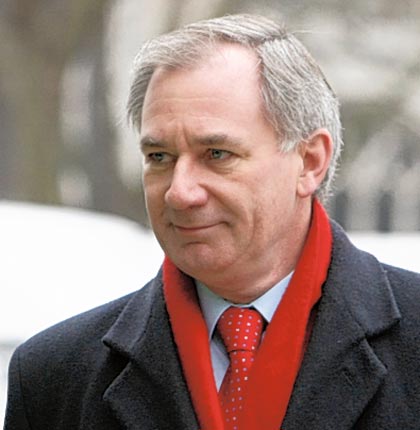Blair was warned of the perils of Iraq occupation

Your support helps us to tell the story
As your White House correspondent, I ask the tough questions and seek the answers that matter.
Your support enables me to be in the room, pressing for transparency and accountability. Without your contributions, we wouldn't have the resources to challenge those in power.
Your donation makes it possible for us to keep doing this important work, keeping you informed every step of the way to the November election

Andrew Feinberg
White House Correspondent
Tony Blair was warned by two cabinet ministers of "long-term damage" to the armed forces from the occupation of Iraq, according to previously classified documents that were released yesterday.
At the time of the March 2003 US-led invasion, the Foreign Secretary, Jack Straw, and the Defence Secretary, Geoff Hoon, told the then Prime Minister that the number of troops on the ground needed to be cut by two-thirds within six months in order to avoid "overstretch".
In the event, the British force in Iraq stayed for six years, with wars being fought on two fronts, as operations in Afghanistan were also under way.
The letter was the latest material produced by the Chilcot Inquiry into the Iraq war following the publication of letters and legal advice from the then Attorney General, Lord Goldsmith, warning Mr Blair that it would be illegal to start military action without a fresh United Nations resolution.
Sir Gus O'Donnell, the Cabinet Secretary, had said that a "long-standing convention" for such documents to be kept confidential had to be waived because the issue of the legality of the Iraq war had a "unique status". However, according to Whitehall sources, the Deputy Prime Minister, Nick Clegg, has been behind the new openness.
In their letter, dated 19 March 2003, Mr Straw and Mr Hoon wrote to the Prime Minister: "It will be necessary to draw down our current commitment to nearer a third by no later than autumn in order to avoid long-term damage to the armed forces.
"Keeping more forces in Iraq would be outside our current defence planning assumptions. If ministers wanted us to, we would need decisions now so that we would be able to recommend what would have to give elsewhere.
"Scaling down to nearer a third will limit our contribution thereafter to a maximum of around one brigade, a two-star headquarters and possible [sic] a contribution to higher level command and control, air and maritime components and support-enablers.
"Our view is that we should probably agree now to tell the US, for planning purposes, that this is the upper limit of our contribution." Tom McKane, the Ministry of Defence's strategy director from 2002 to 2006, said Mr Straw and Mr Hoon's memo was sent amid concerns about Britain's commitment to the conflict.
He told the inquiry: "It became apparent during that period that it was expected that there would be a substantial force retained in place after the fighting had been concluded, for a period of some six months or so, which would have obliged the UK to maintain something like a divisional strength force throughout that period, drawn down to a lower force level thereafter. That in itself would have constituted a breach in the planning assumptions."
Mr McKane said it was assumed at the time that the UK's military involvement in Iraq would last two to three years, with only an army battle group-sized deployment – typically about 1,000 troops – by the end of that period.
Trevor Woolley, the MoD's financial director from 2003 to 2009, acknowledged that the armed forces were stretched by being involved in simultaneous missions in Iraq and Afghanistan. He said: "It was taking us quite considerably beyond the planning assumptions because the planning assumption was that one of the two medium-scale operations would not endure for more than six months." Nearly all British troops were withdrawn from Iraq by the middle of last year.
Subscribe to Independent Premium to bookmark this article
Want to bookmark your favourite articles and stories to read or reference later? Start your Independent Premium subscription today.
Join our commenting forum
Join thought-provoking conversations, follow other Independent readers and see their replies
Comments